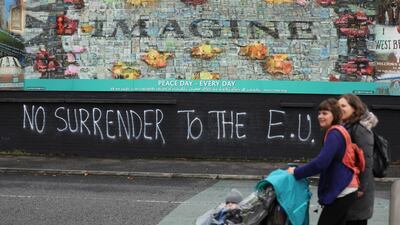With a Brexit deal already drafted between the UK and the European Union, Boris Johnson, the British prime minister, told parliamentarians that talks were pushing strongly to the final summit of Everest even if the peak was shrouded in mist.
The confident tone struck by the British leader came as a small Northern Ireland party held up progress as it hardened its stance on the prime minister's push for a conclusion before EU leaders gather in Brussels for two days of talks on Thursday.
European officials briefed that agreement was at hand on customs and trade arrangements, as well as ironing out how a Belfast assembly would give its consent for new arrangements across the border in Ireland.
Sammy Wilson, the Brexit spokesman of the Democratic Unionist Party (DUP), said both his community and the nationalists would have to consent to the proposed arrangements for trade in Ireland with the EU single market. That was the basis of the 1998 peace agreement struck to resolve tensions. What was proposed did not meet that test. "Not just against the spirit of the agreement, but it is explicitly against the terms of the agreement," Mr Wilson said.
Michel Barnier, the EU's chief negotiator, briefed the 27 countries of the EU on the talks last night and Mr Johnson met with the DUP leadership late on Wednesday. Earlier in the day the British cabinet met to back Mr Johnson.
"The prime minister gave an update to cabinet on the progress in the ongoing Brexit talks. He said there was a chance of securing a good deal but we are not there yet, and there remain outstanding issues," a spokesman said.
Mr Barnier meanwhile, told reporters on Wednesday evening that the two parties had made "good progress" but talks were still ongoing.
French President Emmanuel Macron and German Chancellor Angela Merkel seemed optimistic about an agreement being reached at a joint news conference Wednesday in Toulouse, France, where Ms Merkel said that negotiations were “in the final stretch.”
Mr Macron added that: “I want to believe that a deal is being finalised and that we can approve it” Thursday, when EU leaders are due to meet British Prime Minister Boris Johnson in Brussels.
But Irish Prime Minister Leo Varadkar revealed difficulties centred on trade and the status of the Irish border.
"There is a pathway to a possible deal but there are many issues that still need to be fully resolved," Mr Varadkar said. "I do think we are making progress but there are issues yet to be resolved and hopefully that can be done today."
"But if it's not, there is still more time. October 31 is still a few weeks away and there is the possibility of an additional summit before that if we need one – although time is running short, I am confident that [Ireland's] objectives can be met."
EU officials said there were serious doubts in Brussels about Mr Johnson's ability to pass a deal in parliament, which rejected the previous Withdrawal Agreement three times.
"The UK is negotiating with us again without being able to guarantee a majority in the House of Commons," the EU official said. "We've been here before."
Mr Johnson's Conservatives rely on DUP votes at Westminster since losing its majority in the 2017 general election.
"The dynamics in London do not look as good today as they might have looked in recent days," the European official added.
A motion to call the House of Commons to a special Saturday sitting to consider whatever Mr Johnson brings back from Brussels was proposed after the cabinet meeting.
European leaders were non-committal on the prospects of closing an agreement. Angela Merkel said the news "could be worse" but that should would wait for Mr Barnier's verdict. "I want to believe that a deal is being finalised and that we can approve it tomorrow," said Mr Macron.


